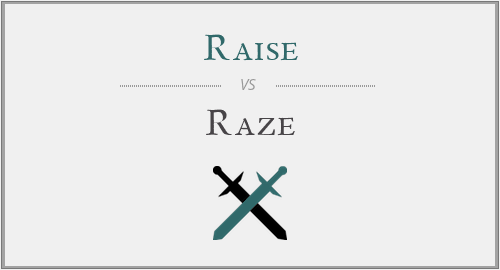Homophones are words that share the same pronunciation but differ in spelling and meaning, such as to, too, two; and so, sew, and sow. Homophones and confusingly similar words are the stuff that malapropisms are made of. A malapropism is the unintentional misuse of a word by confusion with one of similar sound, with humorous results. The words raise and raze sound very similar, but their meanings are very different.
This article covers everything about these two words.
Origin:
The word raise originated from Middle English: from Old Norse reisa ; related to the verb rear. Raze originated from Middle English (in the sense ‘scratch, incise’): from Old French raser ‘shave closely’, from Latin ras- ‘scraped’, from the verb radere.
Raise as verb:
Raise is used as a verb in English language where it means to lift or move to a higher position or level.
She raised both arms above her head.
To increase the amount, level, or strength of something is also called raise.
The bank raised interest rates.
Raise is also used to imply the cause to occur or to be considered.
The alarm was raised when he failed to return home.
To collect, levy, or bring together (money or resources) is also referred to as raise.
It is hoped that the event will raise £50,000.
Raise as noun:
Raise is also used as a noun in English language where it means an increase in salary.
He wants a raise and some perks.
In poker or brag, an increase in a stake is called as raise.

The gentleman raised 20k.
Raze as verb:
Raze is used as a verb in English language where it means to completely destroy (a building, town, or other settlement). It has synonyms like destroy, demolish, raze to the ground, tear down, pull down or knock down.
Villages were razed to the ground.
During the campaign, 80,000 people were killed and 440 villages razed.
Examples:
Naturals, a chain of salons, is making plans to raise around Rs 120 crore from private equity before March next year. (The Business Standard)
Russia is looking for ways to raise revenue to fill a hole in the federal budget caused by the slump in global oil prices. (Reuters)
Raised in Australia, he’s among a wave of Kiwis held on Christmas Island as visas revoked (The Sydney Morning Herald)
Clint Lund and Shane Fitzroy slept in cardboard boxes on Friday night to help raise awareness about New Plymouth’s hidden problem – homelessness. (The Taranaka Times)
Delaware to raze houses to realign intersection near school (The Columbus Dispatch)
Rohrer’s denial of the restraining order means the raze order approved by the City Council on June 22, giving the company 100 days to begin demolition or face having the city raze the property, will stand. (The Herald Times Reporter)
Downfall of the House of York: Bulldozers raze Andrew and Fergie’s derelict mansion (The Daily Mail)
Raise or raze:
The verb to raise means to lift or elevate. Remember, raise is not always about lifting — you can raise a question and raise children. Raze is a less common word. It means to demolish completely or to delete. (It can also be written rase. This is not a UK convention. It is simply an alternative spelling.) Related forms are rases, rased and rasing.




Have a discussion about this article with the community:
Report Comment
We're doing our best to make sure our content is useful, accurate and safe.
If by any chance you spot an inappropriate comment while navigating through our website please use this form to let us know, and we'll take care of it shortly.
Attachment
You need to be logged in to favorite.
Log In